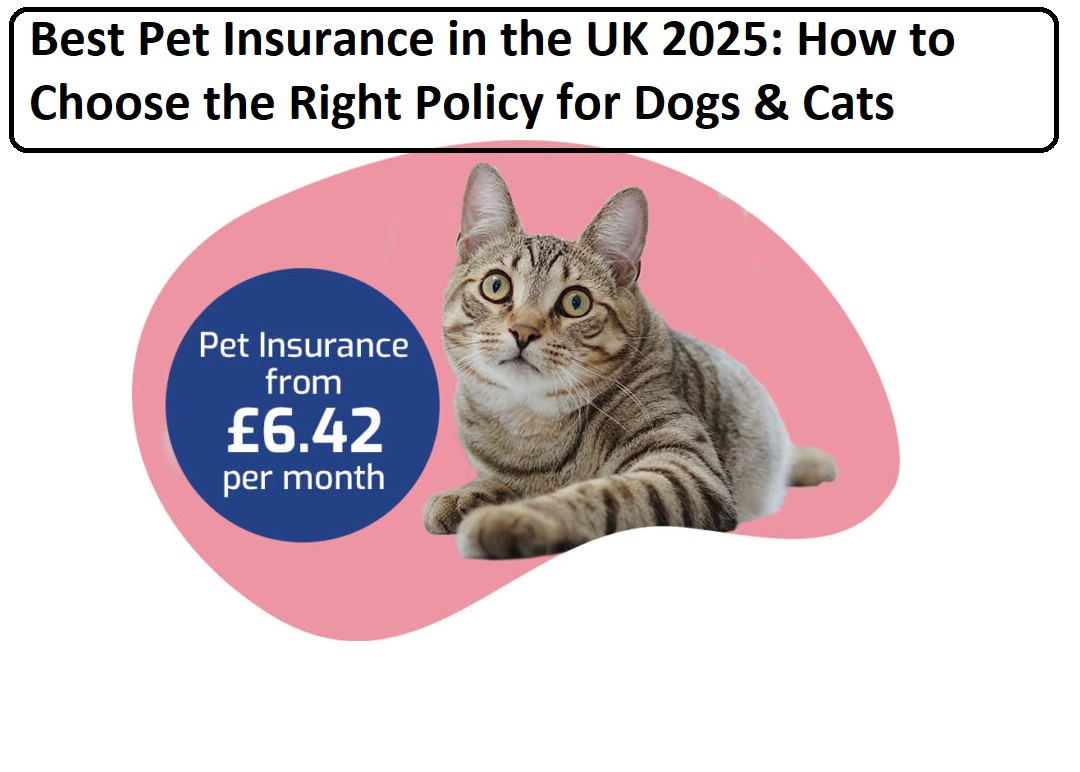Pet Insurance in the UK: Lifetime Cover, Time-Limited, and Accident-Only Explained
If you’re a pet owner in the UK, chances are you’ve asked yourself: “Do I really need pet insurance?” The short answer is yes — and choosing the right policy can save you thousands of pounds while ensuring your furry friend receives the best care possible. Pet insurance in the UK comes in different types, but the most common are lifetime cover, time-limited cover, and accident-only insurance. Each policy offers unique benefits, costs, and coverage limitations, making it crucial for owners to understand the differences before committing.
In this guide, we’ll break down the best pet insurance options in the UK, compare lifetime cover vs time-limited vs accident-only, share real-world examples, and answer common questions UK pet owners search on Google. Whether you’re raising a playful puppy, a senior cat, or even an exotic pet, this article will help you make the most informed decision — and avoid unexpected financial stress.
👉 Related Reading: You may also find it useful to explore articles on Luqoz.com, where pet health and insurance topics are frequently covered.

What is Pet Insurance in the UK?
Pet insurance in the UK is a financial safety net designed to help cover veterinary bills, medical emergencies, accidents, and sometimes even routine checkups for your pets. Unlike human healthcare, which is supported by the NHS, veterinary treatment in the UK is entirely private. This means that whether your pet needs a simple check-up or life-saving surgery, you’ll be responsible for the costs upfront unless you have an insurance policy in place.
For many pet owners, this raises an important question: “Is pet insurance worth it in the UK?” The reality is that modern veterinary medicine has advanced significantly, offering treatments such as MRI scans, chemotherapy, orthopedic surgery, and even advanced dental care for pets. While this is fantastic for animal health, it also means bills can be shockingly high.
💷 Average Vet Costs in the UK
To put things into perspective:
- Emergency surgery for a dog can easily cost £3,000–£6,000, depending on the complexity.
- Chemotherapy for a cat may run up to £5,000 or more, especially if ongoing treatment is required.
- Routine diagnostic tests such as X-rays, ultrasounds, or blood work can cost between £200–£800.
- Annual checkups and vaccinations may average £100–£200 per year, excluding any unexpected illness.
Without insurance, these expenses come directly from your pocket. For families already managing household bills, mortgage payments, and rising living costs in the UK, an unplanned £4,000 vet bill can be overwhelming.

❤️ Why Pet Insurance Matters for UK Pet Owners
Pet insurance isn’t just about covering bills — it’s about ensuring your beloved companion gets the best possible care without compromise. Here’s why it matters:
- Financial peace of mind – You won’t need to worry about how you’ll afford emergency treatment. Instead, you can focus on your pet’s recovery.
- Better healthcare choices – With coverage, you can choose advanced treatment options rather than being limited to only what you can afford on the spot.
- Protection against rising vet costs in the UK – Veterinary expenses continue to increase every year, making insurance even more valuable.
- Support during long-term illnesses – Conditions like diabetes, arthritis, or heart disease require ongoing medication and checkups, which insurance can help cover.
Example for UK Pet Owners
Imagine your Labrador develops hip dysplasia, a common condition among larger breeds. The treatment may include multiple X-rays, consultations with a veterinary specialist, and surgery costing over £7,000. With a lifetime pet insurance policy, most of these costs are covered year after year, provided you renew your policy.
Without insurance, many owners face heartbreaking choices — some are forced to choose euthanasia over unaffordable treatment, even when a cure or long-term care is available. This is exactly why pet insurance in the UK is not a luxury, but an essential safeguard for both pets and owners.

Lifetime Pet Insurance Cover in the UK
What is Lifetime Cover Pet Insurance in the UK?
Lifetime cover pet insurance in the UK is widely considered the most comprehensive and reliable type of pet insurance available to dog and cat owners. Unlike basic accident-only or short-term policies, lifetime cover provides ongoing protection for chronic illnesses, hereditary conditions, and recurring treatments — as long as you continue to renew the policy every year.
This makes it an excellent choice for pet owners who want long-term financial security and peace of mind, especially given the rising cost of veterinary care in the UK. For example, if your dog develops diabetes, arthritis, epilepsy, or skin allergies, lifetime insurance will continue to cover check-ups, medications, and specialist treatments year after year.
Many owners searching “is lifetime pet insurance worth it in the UK?” quickly realize that while premiums are higher, this type of policy is the only option that truly covers long-term conditions without a time cap or financial cut-off.
Benefits of Lifetime Pet Insurance Cover in the UK
Here’s why many UK pet owners choose lifetime cover despite the higher cost:
- Covers chronic and lifelong conditions – Perfect for illnesses like heart disease, diabetes, or thyroid problems that require ongoing treatment.
- Higher annual or per-condition limits – Some providers offer cover up to £10,000–£15,000 per year, ensuring even complex treatments are included.
- Best for pets prone to hereditary issues – Many pedigree dogs and cats are at risk of inherited conditions, and lifetime cover ensures they’re not excluded.
- Peace of mind for pet parents – No need to worry about conditions becoming “uninsurable” after 12 months, which often happens with time-limited cover.
👉 Example of long-tail keywords integrated: “best lifetime pet insurance for dogs in the UK,” “lifetime cover pet insurance for cats UK,” and “UK pet insurance that covers hereditary conditions.”
Time-Limited Pet Insurance Cover in the UK
What is Time-Limited Pet Insurance in the UK?
Time-limited pet insurance in the UK is a policy that provides financial protection for illnesses or injuries but only for a fixed period (usually 12 months) or until the claim limit is reached — whichever comes first. Once this time frame or limit has been exceeded, the condition is classed as “pre-existing” and will not be covered in the future.
This makes time-limited cover a popular choice for UK pet owners who are looking for a more affordable alternative to lifetime pet insurance, especially for younger pets or owners on a tighter budget.
For example, many UK families search for “cheap pet insurance for puppies UK” or “time-limited dog insurance UK” when they want basic protection in case of unexpected vet bills during the early years of pet ownership.
Benefits of Time-Limited Pet Insurance in the UK
Time-limited cover comes with clear advantages for certain pet owners:
- Lower monthly premiums compared to lifetime cover – On average, time-limited pet insurance UK policies cost around £10–£25 per month for cats and £15–£30 per month for dogs, making them budget-friendly.
- Ideal for short-term conditions and accidents – Covers issues like broken bones, ear infections, or temporary illnesses.
- Helps manage unexpected bills – Without insurance, a simple surgery in the UK can cost £2,500+, which many owners cannot pay upfront.
👉 Common keywords: “affordable pet insurance UK,” “short-term dog insurance UK,” “cat time-limited insurance UK.”
Example of Time-Limited Insurance in the UK
Imagine your dog injures its leg while running in the park. Surgery and follow-up care cost around £2,500. With a time-limited pet insurance policy in the UK, the insurer will cover this cost within the 12-month claim period.
However, if your dog later develops arthritis in the same leg, this would no longer be covered because the condition is considered ongoing and outside the 12-month coverage window.
This is why many UK pet owners ask, “Is time-limited pet insurance worth it in the UK?” The answer is: it depends. If you want coverage for unexpected accidents and temporary conditions at a low monthly cost, it’s a good option. But for pets prone to chronic conditions, lifetime cover is often better.
Things to Consider with Time-Limited Pet Insurance UK
While time-limited pet insurance UK is affordable, there are important factors to keep in mind:
- Not suitable for chronic illnesses – Conditions like diabetes, heart disease, or cancer will only be covered for up to 12 months, after which you’ll pay all future costs.
- Creates gaps in coverage – If your pet develops a long-term condition, the cost will quickly fall back on you once the coverage expires.
- Financial limit per condition – Many UK insurers cap claims at around £1,000–£3,000 per condition, meaning ongoing or high-cost treatments may not be fully covered.
Who Should Consider Time-Limited Pet Insurance in the UK?
This type of policy may be suitable if you:
- Are on a tight budget but still want some level of financial protection.
- Have a young, generally healthy pet with a low risk of chronic illness.
- Want short-term cover while you explore whether lifetime insurance is worth the investment later.
Pro Tip for UK Pet Owners: When comparing “time-limited vs lifetime pet insurance UK,” check whether the insurer counts conditions separately or groups them together. Some providers may treat recurring issues as one condition, limiting payouts even further. For more in-depth financial guides, you can also check Luqoz.com, which regularly covers lifestyle and insurance insights for UK readers.
Accident-Only Pet Insurance in the UK
What is Accident-Only Cover?
Accident-only pet insurance is the most basic and cheapest option. It only covers treatment resulting from accidents, such as road traffic injuries, broken bones, or poisoning.
Benefits of Accident-Only Insurance
- Very low monthly premiums – Budget-friendly for owners.
- Provides protection against unexpected accidents.
Example
Your kitten swallows string and requires emergency surgery. Accident-only insurance would cover the cost. However, if the kitten later develops asthma, this policy would not help.
Things to Consider
- No illness coverage – Doesn’t cover conditions like cancer or diabetes.
- Best for young, healthy pets with lower medical risks.
Comparing Lifetime, Time-Limited, and Accident-Only Pet Insurance
| Policy Type | Covers Chronic Illness | Covers Accidents | Covers Time-Limited Conditions | Cost Level | Best For |
|---|---|---|---|---|---|
| Lifetime Cover | ✅ Yes (ongoing) | ✅ Yes | ✅ Yes (with renewal) | 💷 High | Owners wanting full coverage |
| Time-Limited | ❌ No (after 12 months) | ✅ Yes | ✅ Yes (within 12 months) | 💷 Medium | Owners on a budget |
| Accident-Only | ❌ No | ✅ Yes | ❌ No | 💷 Low | Owners seeking minimal cover |
How to Choose the Right Pet Insurance Policy in the UK
Choosing the right pet insurance policy in the UK can feel overwhelming, especially with so many providers offering different types of cover. From lifetime pet insurance to time-limited and accident-only policies, each option comes with its own costs, benefits, and restrictions. The key is to match your pet’s needs with your financial comfort zone and long-term expectations.
Many UK pet owners search “how to choose the best pet insurance UK” or “which pet insurance should I get for my dog in the UK”. The truth is, there isn’t a one-size-fits-all answer — the right policy depends on your pet’s age, breed, lifestyle, and your household budget.
Key Factors to Consider When Choosing Pet Insurance in the UK
-
Pet’s Age and Breed
- Older pets: Many UK insurers either increase premiums significantly or exclude certain treatments once pets pass a certain age (e.g., 8+ for dogs, 10+ for cats). If you have a senior pet, it’s important to look for “UK pet insurance for older dogs” or “best cat insurance for older cats UK.”
- Breed-specific risks: Some breeds are prone to hereditary issues — for example, French Bulldogs often face breathing problems, while Labradors are at higher risk for hip dysplasia. Lifetime cover is often recommended for such breeds because ongoing treatment is likely.
- Budget
- If you’re searching for “cheap pet insurance UK”, time-limited or accident-only policies may be appealing, but remember these won’t cover chronic conditions.
- Lifetime cover offers the best protection, but monthly premiums can be £25–£60 for dogs and £15–£40 for cats, depending on breed and age.
-
Lifestyle
- Outdoor cats face higher risks of accidents and injuries, making broader cover more valuable.
- Active dogs such as working breeds, sporting dogs, or even adventurous family pets are more likely to suffer injuries — another case where lifetime or at least time-limited insurance is a smarter choice.
Pro Tips for Finding the Best Pet Insurance in the UK
-
Compare Multiple Providers
-
Read the Fine Print Carefully
-
Look out for exclusions like pre-existing conditions, dental care, pregnancy-related treatment, or alternative therapies. Many owners only realize too late that a condition isn’t covered.
-
-
Check the Annual and Per-Condition Limits
-
Some policies may advertise lifetime cover but cap payouts at £2,000–£4,000 per condition per year, which might not be enough for advanced treatments like chemotherapy or surgery.
-
-
Consider Multi-Pet Discounts
-
If you have more than one pet, some insurers in the UK offer multi-pet policies that can save you money overall.
-
-
Look at Customer Reviews
Example for UK Pet Owners
If you have a 2-year-old Golden Retriever, you might opt for a lifetime cover policy since this breed is prone to joint and skin issues. The monthly cost might be higher, but you’ll have peace of mind knowing you’re covered long-term.
On the other hand, if you own a young indoor cat, you may find time-limited cover more affordable and suitable for short-term illnesses or injuries.
Pro Tip: Always re-evaluate your policy each year. Pet insurance premiums in the UK can increase as your pet ages, so shopping around or switching policies (with caution about exclusions) can save you money. For more financial and lifestyle tips, check out Luqoz.com, which often covers insurance insights relevant to UK households.
Real-World Examples of Pet Insurance in Action
-
Lifetime Cover Example – A Labrador diagnosed with epilepsy continues treatment for 8+ years, with costs exceeding £12,000. Lifetime insurance ensures ongoing coverage.
-
Time-Limited Example – A Bulldog with a skin condition receives 12 months of treatment. After that, the condition becomes excluded, leaving the owner with the bills.
-
Accident-Only Example – A cat hit by a car receives surgery covered by accident-only insurance. Later, when diagnosed with kidney disease, no coverage is provided.
FAQs on Pet Insurance in the UK
-
Is pet insurance mandatory in the UK?
No, but it’s highly recommended due to high vet bills. -
What is the best type of pet insurance for dogs in the UK?
Lifetime cover is generally the best for dogs, especially breeds prone to health issues. -
Can I switch pet insurance providers in the UK?
Yes, but new providers may exclude pre-existing conditions. -
How much does lifetime pet insurance cost in the UK?
On average, between £20–£60 per month, depending on breed and age. -
Does accident-only pet insurance cover cancer?
No, it only covers accidents, not illnesses. -
What is the cheapest type of pet insurance in the UK?
Accident-only is the cheapest but provides limited coverage. -
Can older pets get lifetime cover?
Some insurers restrict lifetime policies for pets over a certain age. -
Does pet insurance cover routine checkups?
Generally no, unless you add wellness cover. -
What is time-limited insurance best for?
Short-term illnesses and injuries. -
Can I insure exotic pets in the UK?
Yes, but you’ll need specialist insurers.
Conclusion
Pet insurance in the UK is not one-size-fits-all. Lifetime cover, time-limited, and accident-only policies all serve different needs. Lifetime cover is the most comprehensive, protecting pets with chronic conditions. Time-limited offers affordable, short-term help, while accident-only is best for budget-conscious owners who just want emergency protection.
By understanding these options, UK pet owners can make smarter choices that ensure both financial security and the best care for their furry companions.
👉 For more detailed guides on lifestyle and financial decisions, check out Luqoz.com.




